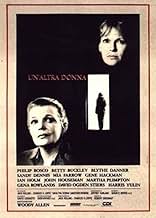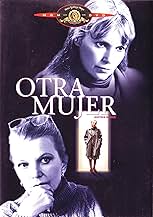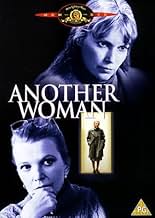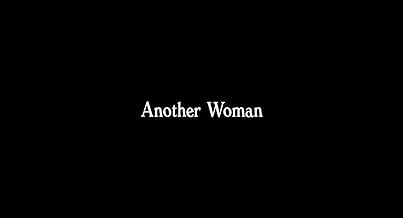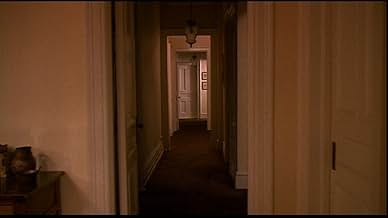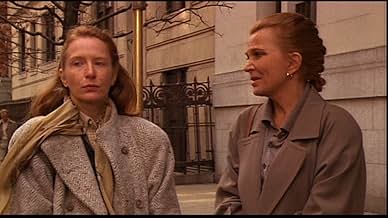Facing a mid-life crisis, 50-year-old college dean Marion Post takes a sabbatical and rents an apartment next to a psychiatrist's office to write a new book, then is drawn to the plight of a... Read allFacing a mid-life crisis, 50-year-old college dean Marion Post takes a sabbatical and rents an apartment next to a psychiatrist's office to write a new book, then is drawn to the plight of a pregnant woman seeking that doctor's help.Facing a mid-life crisis, 50-year-old college dean Marion Post takes a sabbatical and rents an apartment next to a psychiatrist's office to write a new book, then is drawn to the plight of a pregnant woman seeking that doctor's help.
- Awards
- 1 win & 3 nominations total
- Director
- Writer
- All cast & crew
- Production, box office & more at IMDbPro
Featured reviews
This is a wonderful movie but not an easy one. It mixes the present with the past and dreams with real life. You will need to see it three or four times at least to get the best out of it but it's well worth doing. Every performance is spot on, every scene has a purpose, there is no padding here. It comes as a shock to Gena Rowlands character that she is not what she thought she was, that people do not view her in the way she thought they did.She takes a journey through her life to see what went wrong with the unwitting aid of a psychiatrist and patient in the apartment next door. The film ends abruptly without a proper resolution just as life can and does. The final line of Gena Rowlands beautiful narration will haunt you. A masterpiece of writing and direction to say nothing of superb acting and masterful cinematography.
There was a certain period in Woody Allen's career when he was trying desperately to imitate Ingmar Bergman's work. It rarely worked, and often turned out disasters like the execrable September. Another Woman is a riff on Bergman's Wild Strawberries: a college professor, played by Gena Rowlands, is past fifty and looking back on and reliving key events in her life as her present life is falling apart. The film is quite stagy at times, just as it was in September, Allen's previous film. He seems to think that adds something, but it really doesn't. One other problem Another Woman has is a couple of very clunky scenes, and a few poor bit performers, which were much bigger problems in September, which was actually the last Allen film that I saw and the one that made me subconsciously avoid him for the past several months. Allen's script here is excellent. He has produced an excellent character study which is probably unsurpassed in all of his other films that I've seen. The lead actors are wonderful here, Rowlands, Ian Holms, Blythe Danner, Sandy Dennis, and Gene Hackman. Allen's use of piano music is beautifully touching. It all adds up to a very touching and sad little film. It might not be Woody's best film, but it ought to be better respected and known. 8/10.
Woody Allen's "Another Woman" is, upon rediscovery, a film of great power and feeling. Sadly, not many people will be open to rediscovery after the initial viewing.
Gena Rowlands stars as Marion Post, a 50ish philosophy professor whose life is in order. She rents an apartment to work on her latest book. By accident, she discovers that through the heating duct, she can hear all conversations from the psychiatrist located in said building. At first, she covers the duct with cushions to block the sound, but she decides to listen in after hearing, by accident, the testimony of a young pregnant woman. This sets in motion a chain of events that changes Marion forever.
Woody has said that he originally conceived the idea as a comedy and indeed, it could be played that way (on a smaller scale in "Everyone Says I Love You"). But here, Allen resists the temptation to play it for laughs. In fact, there is not one single moment of comedy relief in his film. I think that is a wise decision. I was so absorbed by Marion's journey that comedy would have broken the mood of the film. This film is another venture into Bergmanesque cinema and "Another Woman" can compare with the very best Bergman.
Gena Rowlands hasn't had a role this good since the films of her late husband John Cassavetes. This in fact, shows another side of Rowlands; a more restrained, mannered character than the fiery, passionate characters in the Cassavetes films. It just shows the different types of roles Rowlands can play so well. She deserved an Oscar nomination for this.
In fact, the whole film is well cast by Allen. Gene Hackman is great in a mellow part as Marion's ex-lover. Blythe Danner makes a return to form as Marion's best friend. It is great to see Danner do what she does best, especially following the horrible "Brighton Beach Memoirs" in which she was underused. Ian Holm is superb as Marion's husband, who as Roger Ebert puts it "must have a wife so he can cheat on her". In his final film, John Houseman allows himself to appear weak and frail; quite a change from the pillar of strength in "The Paper Chase" and a good cap to a great career.
I mentioned at the beginning that not many people will be open to rediscovering "Another Woman". I think that is correct. Here are my reasons why. First, the film is deliberately paced, even with a short running time of 81 minutes. Most viewers' attention spans won't be able to tolerate the long takes Allen is famous for. Second, the film doesn't offer any instant gratification or closure. Allen's story is one of those stories that just can't have a typical happy Hollywood ending. Third, there is T&A, even though adultery plays a large part in the story. So if you're looking for a fast paced film with T$A and guns and action and a happy ending, you might as well move on.
"Another Woman" is one of those films in which rediscovery is necessary. Allen packs so much into 81 minutes that multiple viewings are necessary to absorb it all. If you make the effort to see it again, you might find that "Another Woman" is a film of great power and feeling that works better every time you see it.
**** out of 4 stars
Gena Rowlands stars as Marion Post, a 50ish philosophy professor whose life is in order. She rents an apartment to work on her latest book. By accident, she discovers that through the heating duct, she can hear all conversations from the psychiatrist located in said building. At first, she covers the duct with cushions to block the sound, but she decides to listen in after hearing, by accident, the testimony of a young pregnant woman. This sets in motion a chain of events that changes Marion forever.
Woody has said that he originally conceived the idea as a comedy and indeed, it could be played that way (on a smaller scale in "Everyone Says I Love You"). But here, Allen resists the temptation to play it for laughs. In fact, there is not one single moment of comedy relief in his film. I think that is a wise decision. I was so absorbed by Marion's journey that comedy would have broken the mood of the film. This film is another venture into Bergmanesque cinema and "Another Woman" can compare with the very best Bergman.
Gena Rowlands hasn't had a role this good since the films of her late husband John Cassavetes. This in fact, shows another side of Rowlands; a more restrained, mannered character than the fiery, passionate characters in the Cassavetes films. It just shows the different types of roles Rowlands can play so well. She deserved an Oscar nomination for this.
In fact, the whole film is well cast by Allen. Gene Hackman is great in a mellow part as Marion's ex-lover. Blythe Danner makes a return to form as Marion's best friend. It is great to see Danner do what she does best, especially following the horrible "Brighton Beach Memoirs" in which she was underused. Ian Holm is superb as Marion's husband, who as Roger Ebert puts it "must have a wife so he can cheat on her". In his final film, John Houseman allows himself to appear weak and frail; quite a change from the pillar of strength in "The Paper Chase" and a good cap to a great career.
I mentioned at the beginning that not many people will be open to rediscovering "Another Woman". I think that is correct. Here are my reasons why. First, the film is deliberately paced, even with a short running time of 81 minutes. Most viewers' attention spans won't be able to tolerate the long takes Allen is famous for. Second, the film doesn't offer any instant gratification or closure. Allen's story is one of those stories that just can't have a typical happy Hollywood ending. Third, there is T&A, even though adultery plays a large part in the story. So if you're looking for a fast paced film with T$A and guns and action and a happy ending, you might as well move on.
"Another Woman" is one of those films in which rediscovery is necessary. Allen packs so much into 81 minutes that multiple viewings are necessary to absorb it all. If you make the effort to see it again, you might find that "Another Woman" is a film of great power and feeling that works better every time you see it.
**** out of 4 stars
The melancholic mood and Gena Rowland's impressing acting are the most important elements of this movie. It's the Ingmar-Bergman type of film, like Interiors`, much more serious and thoughtful than all of Woody Allen's other movies, not at all typical for him. In my opinion, it's even more vivid than Interiors` because there are less people involved and something that happens less and less in Woody Allen's movies there is only one main character. This time, it's the character herself who tells the story which is really unusual for Allen.
By leaving every other trade mark in plot and topics away, Allen concentrates on the intellectual dialogues and the analyses people make about each other. It's characteristic that Marion Post is a professor for philosophy. She automatically analyzes everybody around her, which leads to the fact that they start analyzing her. Her crisis begins, when she learns that people talk about her which, of course, is something completely natural and therefore starts analyzing herself. Her character really impressed me because I know people myself who are exactly like Marion Post. Woody Allen is a brilliant psychologist who watches people precisely and that's why he is able to create such believable characters.
By leaving every other trade mark in plot and topics away, Allen concentrates on the intellectual dialogues and the analyses people make about each other. It's characteristic that Marion Post is a professor for philosophy. She automatically analyzes everybody around her, which leads to the fact that they start analyzing her. Her crisis begins, when she learns that people talk about her which, of course, is something completely natural and therefore starts analyzing herself. Her character really impressed me because I know people myself who are exactly like Marion Post. Woody Allen is a brilliant psychologist who watches people precisely and that's why he is able to create such believable characters.
8sol-
Bergmanesque territory for Allen again, this is an intriguing and well directed film in Bergman's style, however unlike in some of Allen's earlier Bergman ventures this one feels like less of a copy and more so just a unique drama. The film is philosophical without the ideas seeming intangible, and some of the points are very interesting, like how the pain of others can cause one to realise one's own, and how fascinating it is to hear someone else's revelations. It is not a minute too long, and the dialogue is great, but if one was to flaw it, Allen's choice of music seems a little off-balance, the narration is a touch cold, and whilst not bad, the performances are generally rather ordinary. But all these problems are very slight, as the overall production is fascinating and thought-provoking stuff about how one reflects on oneself.
Did you know
- TriviaWoody Allen is not known for complimenting his actors, saying that the fact that he casts them is proof that he considers them great. However, he has said that the scenes between Gena Rowlands and Gene Hackman, particularly in the flashback of the party, were "electrifying."
- GoofsWhilst it is true that the tune of Gymnopédie No. 1 is played at the beginning of the film, it is not the piano version but rather the orchestral version orchestrated by Debussy. For some unknown reason, Debussy changed the numbers of the Gymnopédies: thus the orchestral version of Gymnopédie No. 3 bears the tune of Gymnopédie No. 1!
- SoundtracksGymnopédie No 1
Music by Erik Satie
Performed by Orchestre de la Société des Concerts du Conservatoire
Conducted by Louis Auriacombe
Courtesy of EMI Pathé-Marconi/Capitol Records Special Markets
- How long is Another Woman?Powered by Alexa
Details
Box office
- Budget
- $10,000,000 (estimated)
- Gross US & Canada
- $1,562,749
- Opening weekend US & Canada
- $75,196
- Oct 16, 1988
- Gross worldwide
- $1,562,749
Contribute to this page
Suggest an edit or add missing content



